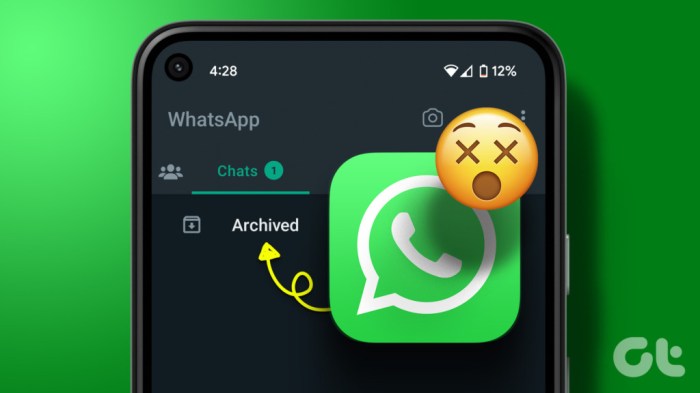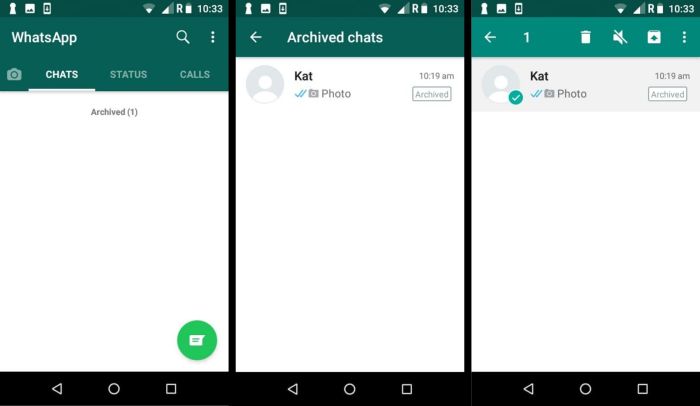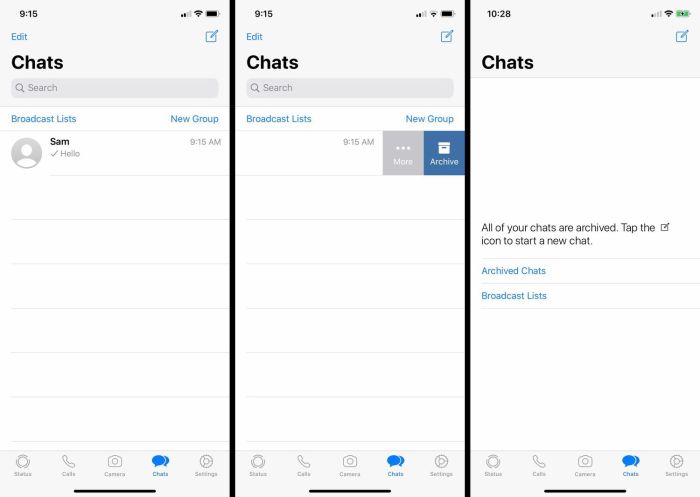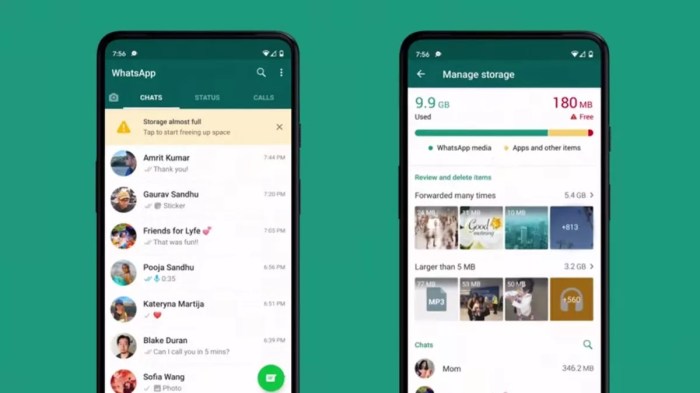Master WhatsApp Archive Management Easily unlocks the secrets to organizing and decluttering your WhatsApp chats. Discover how to archive individual and group chats, retrieve them when needed, and manage large archives efficiently. With step-by-step guidance and practical tips, you’ll become a pro at WhatsApp archive management, maximizing storage space and keeping your chats organized.
Mastering WhatsApp Archive Management
Archiving WhatsApp messages offers several benefits. It helps declutter your chat list, keeping important conversations easily accessible while hiding less frequently used ones. Additionally, it provides a secure storage option, preventing accidental deletion or loss of messages.To archive a chat, simply swipe left on the chat thread and tap the “Archive” icon.
You can also archive multiple chats simultaneously by selecting them and choosing “Archive” from the menu. Alternatively, you can enable automatic archiving for chats that have been inactive for a specified period.
Organizing and Retrieving Archived Chats: Master WhatsApp Archive Management Easily

Mastering WhatsApp Archive Management is incomplete without learning how to organize and retrieve archived chats. WhatsApp allows you to easily access and restore archived chats whenever you need them.
Locating and Accessing Archived Chats
To locate your archived chats, open WhatsApp and tap on the Chats tab. Scroll down to the bottom of the chat list and tap on the “Archived Chats” section. Here, you will find all your archived chats.
Unarchiving and Restoring Chats
To unarchive a chat, simply swipe left on the chat in the Archived Chats section and tap on the “Unarchive” button. The chat will then be restored to your main chat list.
Organizing Archived Chats
To keep your archived chats organized, you can use labels or categories. To create a label, tap on the three dots in the top right corner of the Archived Chats section and select “Labels”. You can then create a new label or choose from existing ones.
To apply a label to a chat, swipe left on the chat and tap on the “Label” button.
Managing Large Archives

Handling an extensive collection of WhatsApp messages can pose challenges, primarily due to storage constraints and the potential for data overload. Here are some strategies to optimize archive storage and enhance retrieval efficiency:
Optimizing Storage Space
- Disable Auto-Download:WhatsApp automatically downloads media files, which can accumulate over time. Disabling auto-download prevents unnecessary storage consumption.
- Use Cloud Storage:WhatsApp allows backing up chats to cloud services like Google Drive or iCloud. This frees up device storage while preserving message history.
- Periodically Delete Unneeded Chats:Regularly review archived chats and delete conversations that are no longer required to reduce storage usage.
Efficient Retrieval
- Utilize Search and Filters:WhatsApp provides search and filter options to narrow down archived chats. Use s, dates, or contact names to locate specific conversations.
- Star Important Chats:Star essential chats to keep them readily accessible in a separate “Starred Messages” section.
- Use Third-Party Apps:Explore third-party apps that offer enhanced search and management capabilities for WhatsApp archives, such as “WA Tools” or “WhatsRemoved+.”
Exporting and Importing Archives

WhatsApp’s archive feature allows you to hide chats from your main chat list, but they remain accessible in the Archived Chats section. However, if you want to back up or share these archived chats, you can export them as a file.
To export an archived chat, open the chat and tap the three dots in the top right corner. Select “Export Chat” and choose whether to include media or not. You can then save the file to your device or share it with others.
Importing Exported Archives
To import an exported archive, open WhatsApp and go to the Archived Chats section. Tap the three dots in the top right corner and select “Import Chats.” Select the file you want to import, and WhatsApp will restore the chat to your main chat list.
File Formats
WhatsApp archives are exported as .txt files. This format is plain text and can be opened with any text editor. However, if you want to import the archive back into WhatsApp, it must be in the .txt format.
Privacy and Security Considerations
Archiving WhatsApp messages raises privacy concerns. However, WhatsApp implements encryption and security measures to protect archived data. Here’s how to ensure privacy and security:
Encryption and Security Measures
- WhatsApp uses end-to-end encryption to secure messages, ensuring only the sender and recipient can read them.
- Archived messages are stored on the user’s device and not on WhatsApp servers, minimizing the risk of data breaches.
- WhatsApp employs regular security updates to address vulnerabilities and enhance protection.
Tips for Ensuring Privacy
- Use a strong password or passcode to protect your device.
- Enable two-factor authentication to add an extra layer of security.
- Avoid archiving sensitive information that could compromise your privacy.
- Regularly review and delete archived chats that are no longer needed.
Advanced Archiving Techniques

Mastering WhatsApp archive management involves utilizing advanced techniques to organize and retrieve specific types of content effectively. These techniques empower users to manage media files, documents, and links efficiently, ensuring seamless organization and easy access.
Custom Filters and Labels
WhatsApp allows users to create custom filters and labels for targeted archiving. By defining specific criteria, such as file type, sender, or , users can automatically archive messages that meet these conditions. This enables efficient organization and quick retrieval of desired content.
WhatsApp API and Third-Party Tools
For advanced archive management, users can leverage WhatsApp’s API or employ third-party tools. These tools provide enhanced functionality, such as bulk archiving, automated backups, and advanced search capabilities. By integrating these tools with WhatsApp, users can streamline their archiving process and gain greater control over their archived content.
Troubleshooting Archiving Issues
Managing WhatsApp archives effectively requires attention to potential issues that may arise. This section delves into common problems and provides solutions to ensure the integrity and accessibility of your archived chats.
Identifying Common Problems
During WhatsApp archive management, users may encounter various problems. These include:
- Missing archives
- Corrupted data
- Access problems
Solutions and Troubleshooting Steps, Master WhatsApp Archive Management Easily
To resolve these issues, follow these steps:
- Missing archives:Check the WhatsApp settings to ensure the “Keep chats” option is enabled. If archives are still missing, try searching for them using the chat search feature or restoring them from a backup.
- Corrupted data:Uninstall and reinstall WhatsApp. This will recreate the archives and restore them from the most recent backup.
- Access problems:Check if WhatsApp is up to date and that you have a stable internet connection. If the issue persists, try clearing the WhatsApp cache or restarting your device.
Best Practices for Maintaining Archive Integrity
To ensure the longevity and accessibility of your archived chats, follow these best practices:
- Regular backups:Regularly create backups of your WhatsApp data to prevent data loss.
- Use a reliable cloud storage service:Store your archives in a secure and reliable cloud storage service to protect them from device failures or accidental deletion.
- Limit the size of archives:Keep archives under 1GB to avoid potential corruption issues.
Benefits of Archiving WhatsApp Chats
Archiving WhatsApp chats offers a multitude of benefits beyond mere organization and storage. It serves as a valuable tool for data recovery, compliance, and legal matters, enabling businesses and individuals to leverage archived chats for various purposes.
Data Recovery
Archiving WhatsApp chats creates a backup of your conversations, safeguarding them against accidental deletion or device loss. In the event of a device malfunction or data loss, you can easily restore your archived chats, ensuring the preservation of important messages and media files.
Compliance and Legal Matters
Archiving WhatsApp chats is crucial for businesses that need to comply with data retention regulations. By archiving chats, businesses can meet legal requirements for preserving electronic communications and provide evidence in legal proceedings or investigations.
Leveraging Archived Chats
Archived WhatsApp chats can be a valuable asset for businesses and individuals alike. Businesses can use archived chats to:
- Analyze customer interactions and improve customer service.
- Conduct market research and gain insights into customer preferences.
- Train employees on effective communication and customer handling.
Individuals can use archived chats to:
- Preserve memories and revisit important conversations.
- Document personal and professional interactions for future reference.
- Share archived chats with others for collaboration or nostalgia.
Best Practices for WhatsApp Archive Management
Implementing effective WhatsApp archive management practices is crucial to ensure efficient organization, retrieval, and preservation of archived chats. Here are some best practices to consider:
Establish automated archiving rules to automatically archive chats based on specific criteria, such as chat age, message count, or s. This helps reduce manual effort and ensures consistent archiving.
Categorizing Archives
Categorize archives into meaningful groups, such as personal, business, or project-related. This facilitates easy identification and retrieval of specific chats.
Regular Maintenance
Conduct regular maintenance to review and delete unnecessary archives. This helps optimize storage space and prevents data overload.
Storage Optimization
Use compression techniques to reduce the size of archived files, saving storage space without compromising data integrity.
Data Longevity
Consider using cloud storage services or external hard drives to ensure the longevity and accessibility of archived data, minimizing the risk of data loss due to device failure or accidental deletion.
Case Studies and Success Stories
Explore real-world examples of successful WhatsApp archive management implementations, showcasing the challenges, strategies, and benefits experienced by individuals and organizations.
These case studies demonstrate the practical applications and positive outcomes of mastering WhatsApp archive management, providing valuable insights and inspiration for your own archiving endeavors.
Case Study: Streamlining Communication for a Global Team
- Challenge: Managing a large volume of WhatsApp chats across multiple time zones and languages.
- Strategy: Implemented a structured archiving system, categorizing chats by project and language, and using search filters to retrieve specific conversations.
- Outcome: Improved collaboration and efficiency, reducing time spent searching for information and minimizing miscommunication.
Last Word
Mastering WhatsApp Archive Management empowers you to keep your chats organized, prevent data overload, and leverage archived chats for various purposes. By implementing the strategies Artikeld in this guide, you’ll gain control over your WhatsApp archives, ensuring the longevity and accessibility of your important conversations.
Frequently Asked Questions
How do I archive a WhatsApp chat?
To archive a chat, swipe left on the chat in the chat list and tap the Archive icon.
How do I retrieve an archived chat?
To retrieve an archived chat, scroll to the top of the chat list and tap Archived Chats. Then, tap and hold the archived chat you want to retrieve and select Unarchive.
Can I automatically archive chats?
Yes, you can set up automatic archiving rules in WhatsApp’s settings.
How do I export WhatsApp archives?
To export an archive, open the chat, tap the chat info, and select Export Chat. You can choose to export with or without media.
How do I import WhatsApp archives?
To import an archive, open WhatsApp and go to Settings > Chats > Chat History > Import Chats. Select the archive file and tap Import.